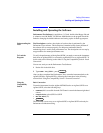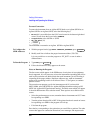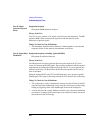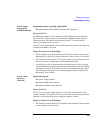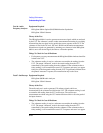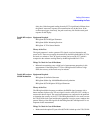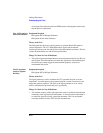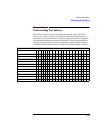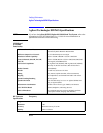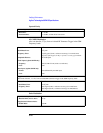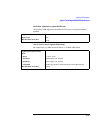
3-11
Verifying Performance
Understanding the Tests
faulty also. If the front panel reading from the UUT is significantly different from
the printed “measured” response, the normalization may be the cause. If the
oscilloscope triggers incorrectly, the peak search may not find the actual peak
response on the display.
Test08:RFAnalyzer
Level
Equipment Required
HP/Agilent 8657A/B Signal Generator
HP/Agilent 8902A Measuring Receiver
HP/Agilent 11722A Sensor Module
Theory of the Test
The signal generator is used to generate CW signals at various frequencies and
power levels. These are accurately characterized by the HP/Agilent 8902A/11722A
and used as a reference. The CW signals are then used to test the UUT which is
compared to the reference reading taken by the HP/Agilent 8902A/11722A.
Things To Check In Case Of Problems
• Mismatch uncertainties cause a high level of measurement uncertainty in this
measurement. If the HP/Agilent 11722A or HP/Agilent 8657A/B has a high
SWR, the accuracy of the results may be reduced.
Test09:RFAnalyzer
GMSK Modulation
Equipment Required
HP/Agilent 8116APulse Generator
HP/Agilent 8904A Opt. 001/002Multifunction Synthesizer
HP/Agilent 8657A/B Option 022.Signal Generator
Theory of the Test
The HP/Agilent 8904A frequency modulates the GMSK signal generator with a
known amount of phase error. This test signal is used to verify the UUT’s ability to
measure this known signal. The actual measurements are compared to the predicted
to determine the accuracy of the UUT. The HP/Agilent 8904A is also used to create
the 270.833 kHz clock signal and the pulse generator is used to create a random data
pattern. Polarity of the data signal from the HP/Agilent 8657A/B Option 022 is not
important in this measurement.
Things To Check In Case Of Problems
• Make certain the option 022 part of the 8657A/B is locked up to the 270.833 kHz





